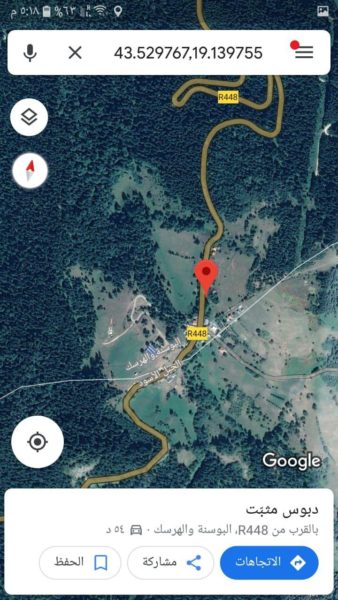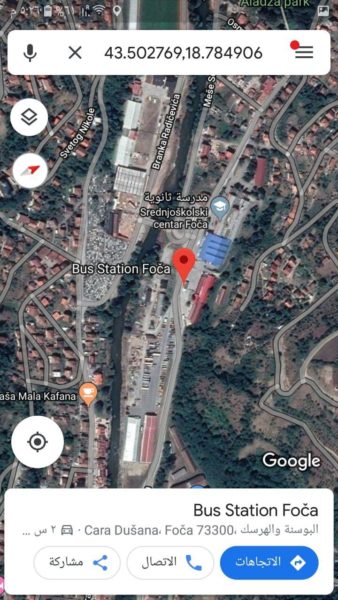Starting their journey from Albania, 4 Syrian men, all of them between 22 and 25 years old, arrived in Konik camp in Podgorica, Montenegro (MNE) in the morning of the 1st May. One of them had an injured hand as a result of a fall in the Montenegrin mountains. They were told that it’s not possible for them to stay in the Konik camp as access is intended mainly for families. They encountered a local person who offered them private shelter, but the group found the conditions of the accommodation unacceptable. Instead, they took a taxi to the camp in Spuž where they arrived at 7.30 am. They didn’t wish to stay there, however. They wanted to register at the camp’s reception centre in order to get papers indicating their stay in Montenegro as legal. After the registration process that included the collection of their personal information (name, nationality, date of birth) as well as the taking of fingerprints, they went to a hotel in Podgorica where they payed 10€/night per person.
The group stayed there for 4 nights to get some rest from the previous stage of their journey and to prepare for the next stage. On 4th May, they took a bus to Pljevlja (MNE) where they arrived at around 9:00 pm in the evening and stayed for two more days in a hotel. They took a taxi to a place 3km in front of the Bosnian border with Montenegro. On 6 May around midnight they walked from the border for two days through mountains and forests before arriving approximately 7km in front of Foča (BiH) on the 8th of May around 3:00 am. While approaching the village on a street that the respondent describes as “mainly used by border police, no public street”, a blue-white police van approached them.
“Two of our friends managed to hide in some bushes next to the street, but me and my friend were too tired. They were lucky, police didn’t see them and they are now in Bosnia, we are still here.”
Two police officers that the respondent describes as border police (even though he didn’t recognize any of the Bosnian police uniform emblems that the interviewer showed him) got off the car. One of them is described as “very very big, bigger than normal Montenegro people and they are already very big” and the other as “normal”.
They were asked for their papers and ID cards but denied having any of those.
“We just say we are from Syria and want to go to Sarajevo. I didn’t ask for asylum, I don’t want to stay in Bosnia.”
The officers asked the men for money and took in total 50€ from them before putting them in the car in a way that the respondent describes as “normal, without violence” and drove approximately 1h 30min with them to a place near the border with Montenegro (see Fig. 1)
At this point, they were let out of the car and told to go back to Montenegro by foot. The men pretended to walk back, but when the officers drove away, they stopped, took a break and decided to try it one more time after having checked their provisions and found them to be sufficient for a second attempt.
However, this time they took many breaks.
“Always 4 hours walking, 15 minutes break, 5 hours walking, 15min break, we were very tired. Sometimes there were cars on the road, whenever a car approached we were hiding behind trees next to the street.”
After a day and a half, they arrived at the bus station in Foča (BiH, see Fig. 2) where they met a group of five other men in their early 20s, all from Syria. They decided to take the next bus to Sarajevo together. They pooled their money and one member of the group went to the counter to buy tickets for all of them.
“This man is very lucky man, in Sarajevo now with all money for tickets!”
Soon after the man left to the counter inside the building, two local police officers appeared. They stopped the group and called another police unit that the respondent describes as border police. Four officers of this unit arrived in one blue-white police van and the police ordered the group of now six individuals into the van.
Again, they drove with them around 1h30min to the same place as last time (see Fig. 1), where they took them out of the the car and told to walk back to Montenegro. And again, after the officers drove away, four of the men decided to try another time to reach the bus to Sarajevo at the bus station in Foča (BiH, see Fig. 2). The respondent and his friend, however, as it was already their second failed attempt, were too exhausted and were running out of food and water so they decided to just go back to Montenegro in order to recover and try it again some days later.
“I try again, I lost my country, I don’t care.”
The two men crossed the border by foot (see Fig. 1) and took a bus to Nikšić (MNE).

Fig. 1: The place where they were brought by Bosnian police. This pin is only approximate.

Fig. 2: The bus station in Foča (BiH) where the men were caught the second time
